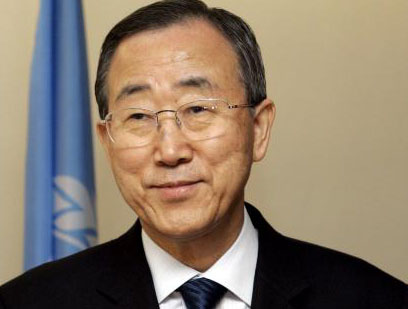UN secretary general to visit Myanmar at year-end
 Yangon - UN Secretary General Ban Ki-moon plans to visit Myanmar in December to discuss the country's political stalemate, his special envoy to Myanmar Ibrahim Gambari disclosed Wednesday.
Yangon - UN Secretary General Ban Ki-moon plans to visit Myanmar in December to discuss the country's political stalemate, his special envoy to Myanmar Ibrahim Gambari disclosed Wednesday.
"Ban Ki-moon plans to come to Myanmar in the last week of December but this time the trip will be focused on politics," said Nyan Win, the spokesman for the opposition National League for Democracy (NLD).
Gambari, who arrived in Myanmar Monday, met with the NLD central executive committee Wednesday afternoon at which he disclosed Ban's travel plans.
Ban was last in Myanmar in May, when he made an emergency visit to pressure the country's junta to allow an inflow of international aid and relief workers to succor the victims of Cyclone Nargis, which left about 140,000 people dead or missing.
Ban was criticized at the time for concentrating on the aid emergency and neglecting Myanmar's long-simmering political caldron, such as the junta's refusal to free opposition leader Aung San Suu Kyi from house arrest after five years or to introduce genuine political reforms.
The visit is Gambari's fourth since last year to Myanmar, also known as Burma, where he has been handed a mandate by the United Nations to deal with the country's military regime in addressing international concerns about human rights violations, slow-paced political reforms and the ongoing detention of opposition leader Suu Kyi and hundreds of other political prisoners.
The State Peace and Development Council, as Myanmar's junta calls itself, has shown little willingness to comply with Gambari's overall mission.
On August 7 in Yangon, for example, Myanmar authorities arrested three members of the All Burma Federation of Student Unions and two members of the 88 Generation Students, two pro-democracy groups, whose whereabouts remain a mystery.
Myanmar has been under the equivalent of martial law since 1988 when the army unleashed a brutal crackdown on a nationwide pro-democracy movement that left an estimated 3,000 people dead and thousands more in prison.
Bowing to international pressure, the regime held a general election in 1990, which the National League for Democracy (NLD), led by Suu Kyi, won with a landslide victory.
Instead of acknowledging the outcome at the polls, the junta has blocked the NLD from power for the past 18 years, keeping Suu Kyi - who received the Nobel Peace Prize in 1991 - under house detention for 13 of those years. (dpa)